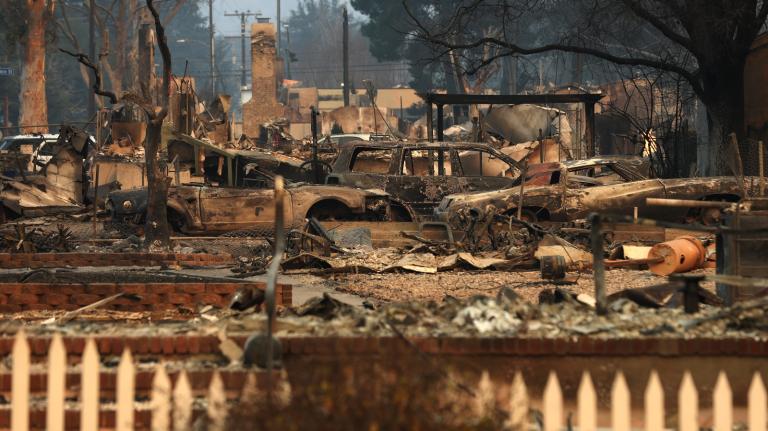Things fall apart; the centre cannot hold.
I have heard from multiple sources that many U.S. senators are now getting 100 to 200 calls a day opposing a climate and clean energy bill — and bupkes in favor.
The best lack all conviction, while the worst
Are full of passionate intensity.
Why? Well, the entire conservative messaging apparatus is full-throated in its opposition to this bill — and they have well-heeled funders, aka the dirty-energy bunch. Our side is half-throated, at best. Indeed, many progressive/enviro activists spend their time pointlessly trashing the bill and threatening Democrats (see here and here).
No, it’s not accurate to suggest they lack all conviction. Yes, some of the pseudo-environmentalists who are devoting 100 percent of their time publicly and privately to killing this bill have no convictions and hypocritically support a far weaker bill (see “The Breakthrough Institute is lying about Obama, misstating what CBO concluded about Waxman-Markey, and publishing deeply flawed analyses“).
But most have a very strong conviction that we need a better bill, which we do, and a misguided conviction that failing to aggressively support passage or even opposing the bill outright “in its current form” or “if it is not substantially improved” will lead to better environmental outcomes. It will not.
Suck it up, people. This is the meat and potatoes of politicking, and the other side is extremely good at it because they know those calls matter. They mattered in the House.
The opposition to Waxman-Markey did a good job with phone calls to House members. They at least matched the calls that enviros and progressives delivered — though I’m told an analysis shows that most of their calls were out-of-state, while most of ours were in state. Still, that’s one reason we didn’t get more votes.
The climate destroyers are keeping up their attack on vulnerable House members — even if it means eating their own (see “Honey, I shrunk the GOP, Part 1: Conservatives vow to purge all members who support clean energy or science-based policy“).
The good news is that The Hill reports, “A coalition of labor, environmental and veterans groups is spending serious money to make sure Democrats who supported the cap-and-trade legislation have political cover.” Very important stuff, for sure — after all, the House is going to have to vote again on some House-Senate conference version of this bill in early 2010 assuming the Senate acts.
But we should be equaling, if not beating, calls to key senators right now. Heck, I’m told that Senators who aren’t even really swing votes are getting more than 100 calls a day opposing climate action. And those matter too, in terms of how even Senators on our side gauge public sentiment and how much they are willing to fight for the strongest possible bill.
Marches and civil disobedience have their place, but it is not what is needed in the next few months — unless you plan to march to D.C. with others in your state and talk to your senator about why we urgently need a climate and clean energy bill.
People and clean energy businesses should be organizing calls in most states — although you can figure out the most important states and members from this post — see “Epic Battle 3: Who are the swing senators?”
If you think the bill should be a lot stronger — and who doesn’t? — make that the message. I’ll do a post next week on what I think the core message of climate science activists should be, but, frankly, calls to senators are taken by 20-something staffers (if you’re lucky), and they ain’t gonna be repeating any of your nuanced points.
Reason enough for passage of a bill with emissions targets like Waxman-Markey (preferably stronger) is to give the international climate negotiations in Copenhagen (and beyond) a fighting chance — and not to strangle a global deal in the crib as the deniers and polluters hope to do with their immoral and ultimately self-destructive filibuster.
William Butler Yeats knew nothing of global warming — but he knew everything about his era’s own self-inflicted global catastrophe, The First World War. His 1919 poem, “The Second Coming,” has “nothing in common with the typically envisioned Christian concept of the Second Coming of Christ,” as Wikipedia explains, but is “an approaching dark force with a ghastly and dangerous purpose.” No doubt that is why the poem resonates so well today — and why, I fear, it will ring increasingly true in the coming decades if we don’t change course soon:
Turning and turning in the widening gyre
The falcon cannot hear the falconer;
Things fall apart; the centre cannot hold;
Mere anarchy is loosed upon the world,
The blood-dimmed tide is loosed, and everywhere
The ceremony of innocence is drowned;
The best lack all conviction, while the worst
Are full of passionate intensity.Surely some revelation is at hand;
Surely the Second Coming is at hand.
The Second Coming! Hardly are those words out
When a vast image out of Spiritus Mundi
Troubles my sight: a waste of desert sand;
A shape with lion body and the head of a man,
A gaze blank and pitiless as the sun,
Is moving its slow thighs, while all about it
Wind shadows of the indignant desert birds.
The darkness drops again but now I know
That twenty centuries of stony sleep
Were vexed to nightmare by a rocking cradle,
And what rough beast, its hour come round at last,
Slouches towards Bethlehem to be born?

